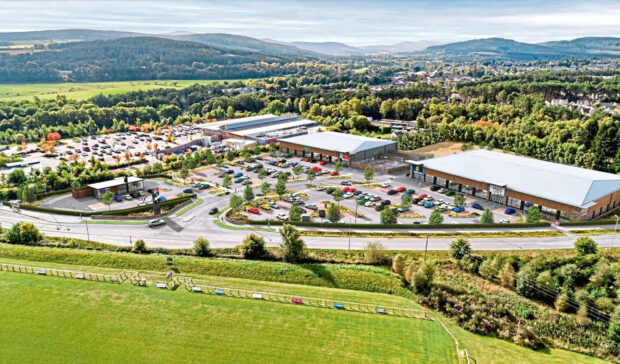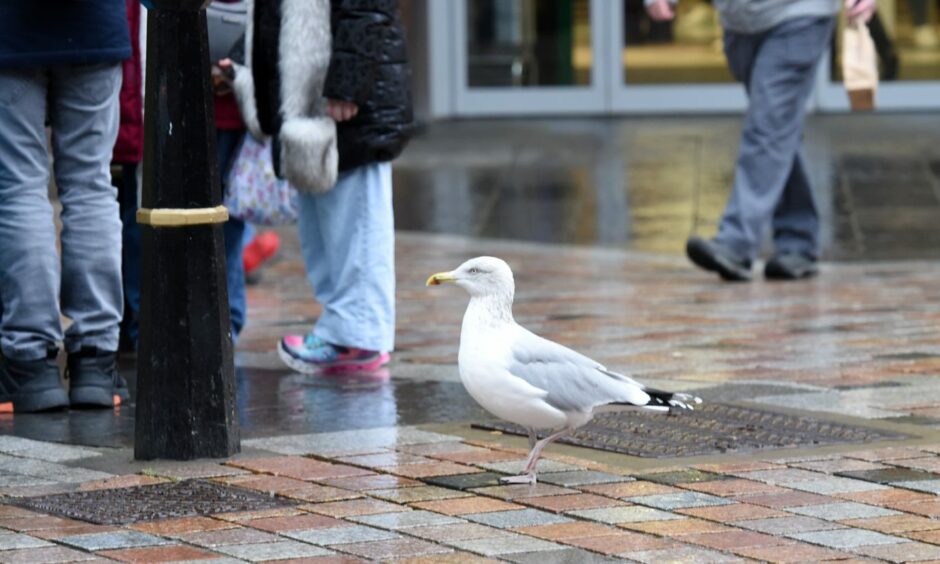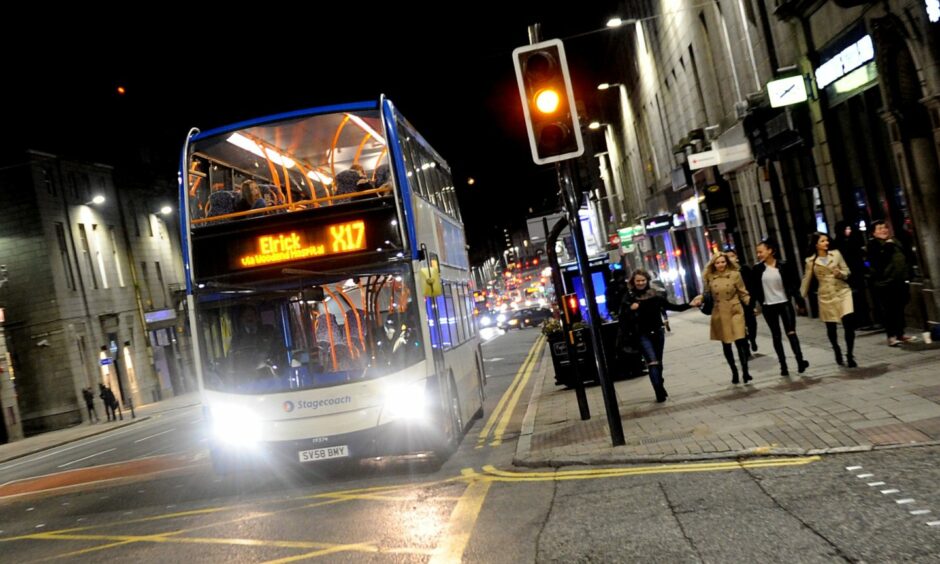Sir, – I refer to the article in The Press and Journal of January 6. Councils across the country are desperately trying to regenerate high streets, including Union Street in Aberdeen, and are trying to fill empty shops to bring back shoppers so that the high streets across the country are not simply a series of boarded-up properties.
The proposal by Banchory Estates for a shopping complex at the back of Tesco would surely sound the death knell of the town’s High Street, undoing any effort the council is trying to put in place for regeneration and to stop decay. Potentially, such a Hill of Banchory development would draw in customers from a relatively wide surrounding area which would also have a negative impact on retail outlets in those localities.
Businesses are finding it difficult to recruit staff and, whether we like it or not, they have to make a profit to survive. If I am right, the potential for really new jobs in the business park would be very low as all that would happen would be a shift of staff from closing retail outlets in Banchory High Street to the retail park.
Companies that are interested in having outlets in the proposed retail park should be encouraged to move to the High Street and not contributing to its demise.
As such, this proposal should be given scant consideration and dismissed.
WHC Richmond, Kirkton of Durris, Banchory.
There’s more to life than grubby wealth
Sir, – In his letter of January 7, Andrew Dingwall-Fordyce asks for a crystal ball plus some kind of guarantee before he consents to consider Scotland running its own affairs. As a businessman and owner of an estate, he will know that risk is everywhere and also that nothing stays the same.
The question is rather one of risk management and then it becomes blindingly obvious that by all recognised international metrics, Scotland can and will do very well on its own.
The option is to go down with the sinking ship SS UK, holed below the water line and rudderless. Decades of decline have led to under-investment in every facet of our social fabric. The UK is skint, in debt up to its eyeballs and now isolated from its biggest trading partner.
It’s not a difficult choice, and that’s only discussing economics. It might come as a surprise to folk like our writer laird but a growing number of Scots people would prioritise happiness, health and wellbeing above chasing grubby wealth.
No economist or government can give accurate predictions and events will occur to upset the best-laid plans but the direction of travel for UK does not look good in any way. We can do better on our own – man the lifeboats.
Peter E. Smith, Aigas, Beauly.
Time for Scotland to grasp the thistle
Sir, – National treasure – preserve it or sell it? It depends on your view of the state of the NHS, its functions and the role of big business. Either way, it’s all falling into place for the Tories but it doesn’t bode well for most citizens.
The NHS is needing emergency funding, but what it will see instead will be the private sector being hired in to help with the demand to cut waiting times, the next phase of the privatisation plans.
Humza Yousaf admitted health workers are enduring a “perfect storm” as it emerged 160 NHS Grampian A&E patients waited more than 12 hours to be seen in just one week.https://t.co/hqR8OVHPcY
— The Press & Journal (@pressjournal) January 11, 2023
The result will be to reduce NHS funding even further, meaning no Barnett consequentials for the Scottish NHS. What will it take for people to wake up and realise what Westminster governments do to Scotland – a naturally-wealthy energy-rich country saddled with foodbanks, crumbling infrastructure and fuel poverty?
Our job must be to show that it can be different and we can have a successful, wee outward-looking north European country with happier healthier people.
There’s much to do of course, but it starts with a step. People need to grasp the thistle and demand independence for Scotland.
Herbert Petrie, Parkhill, Dyce, Aberdeen.
Encouraging urban gulls is bird-brained
Sir, – Initially, I was amazed to read (Letters, January 9) that anyone, let alone a councillor, was opposed to work to discourage herring gulls from living in the centre of Inverness – I could not believe someone could be such a bird-brain as urban gulls are flying rats.
Then I realised it was a Green Party councillor spouting such nonsense and that I had overestimated the level of common sense allocated.
Jenny Matheson, Annfield Road, Inverness.
Role of religious representatives
Sir, – In his piece on January 3, Garrett Stell discusses the undemocratic anachronism of unelected and unaccountable religious nominees on council education committees – whether they should have votes or, indeed, given their minority representation of Scots, have seats at all.
Opposing any change to the status quo is Marian Macintyre from the Church of Scotland’s Faith Impact Forum who argues that, even without a vote, these intruders contribute with “sensitive and informed discussions” representing the “ethos of their faith group” and that theirs is a “pastoral” role.
Religious representatives defend divisive sectarian faith schools to maintain their precious “ethos”, they seek to reduce information available to LGBT young people in the ridiculous belief that they will then not “choose” such a lifestyle, and Edinburgh Secular Society uncovered an example of a creationist who called evolution “really illogical”, sitting at the table in South Lanarkshire.
What possible wisdom is Mrs MacIntyre defending other than to suggest more of her God in schools?
Neil Barber, Edinburgh Secular Society, Saughtonhall Drive.
Unionists urged to just carry on
Sir, – The support for independence is stable, if not increasing, and Scottish residents are seeing there is an alternative available in 21st Century Scotland.
Letters to these pages, such as that of George Emslie (January 9) can only increase support, so keep up the good work Mr Emslie and colleagues.
They may not be aware, but among the highest number of immigrants to Scotland are retired English residents.
Ron Campbell, Richmond Walk, Aberdeen.
Bus travelling times too long
Sir, – I noticed in last Saturday’s edition of the Evening Express someone stating that the bus took two-and-a-half hours to do the 60 miles between Elgin and Aberdeen.
Luxury. It takes the number 35 bus three hours to do the shorter journey from Buckie to Aberdeen and, unlike Elgin, there is no option of going by train.
I think it takes around the same amount of time to go by bus from Aberdeen to Glasgow.
Over the years I have seen the journey time by bus increase and the amount of passengers decrease.
Three hours plus waiting time (which can be considerable) is too long for older people with weaker bladders which means that a taxi to Keith and half the time on a train with a toilet is a better, if far more expensive option.
However, I also have it easy in comparison to the inhabitants of Sandend, Fordyce, Cornhill and countryside where a magic carpet is the best option and THEY are expensive.
Ian Lumsden, Portsoy.
Salt and Rhoades
Sir, – Aberdeen’s gritter staff received much praise from the council for their hard work during the 10 days of snow and ice (EE, December 29).
Pity about the pavements in housing schemes. After British motorists survived the first fall of snow, I learned that the national winter and severe weather team leader for England’s Strategic Road Network is called Matt Salt and National Highways’ press officer is called Howard Rhoades.
Any more names that match jobs?
T Shirron, Aberdeen.



